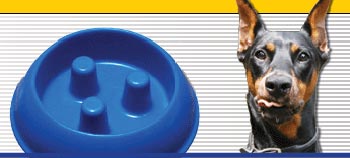
Image from www.brake-fast.net
Thanks to Steve Portigal and Page Sands for bringing this to my attention: the Brake-Fast Doggie Bowl is designed to stop dogs wolfing down their food quite as quickly as they would otherwise, which can cause painful (and dangerous) bloating. The raised prongs act like ‘traffic calming’ to slow down the dog’s eating.
This is a clever forcing function architecture of control, with the intention of making life better for the animal without risk of injury. There’s also another interesting feature – or rather deliberate lack of one:
(Q) The brake-fast(R) bowl slides all over the floor when my dog eats.
Why didn’t you put a non-slip edge on the bottom?
(A) We had a lot of discussion about the bowl sliding. In the end, we decided the purpose is to make the dog slow down their consumption rate, having the bowl slide adds that much more time when eating.
(From the Brake-fast website)
There are many examples of feeding systems or toys designed to entertain and distract dogs (and other animals) while being fed, since dogs clearly enjoy challenges, particularly when they result in a ‘reward’ of food. Steve points me to Kong dog toys which are designed to be filled with food which the dog can only get at by playing with the toy and chewing it, and I should also mention Simon Crilley’s Canine Joystick, a more advanced system which actually monitors the extent of the dog’s play before sending a signal to a wall-mounted food dispenser (another image here – PDF link).

6 Comments